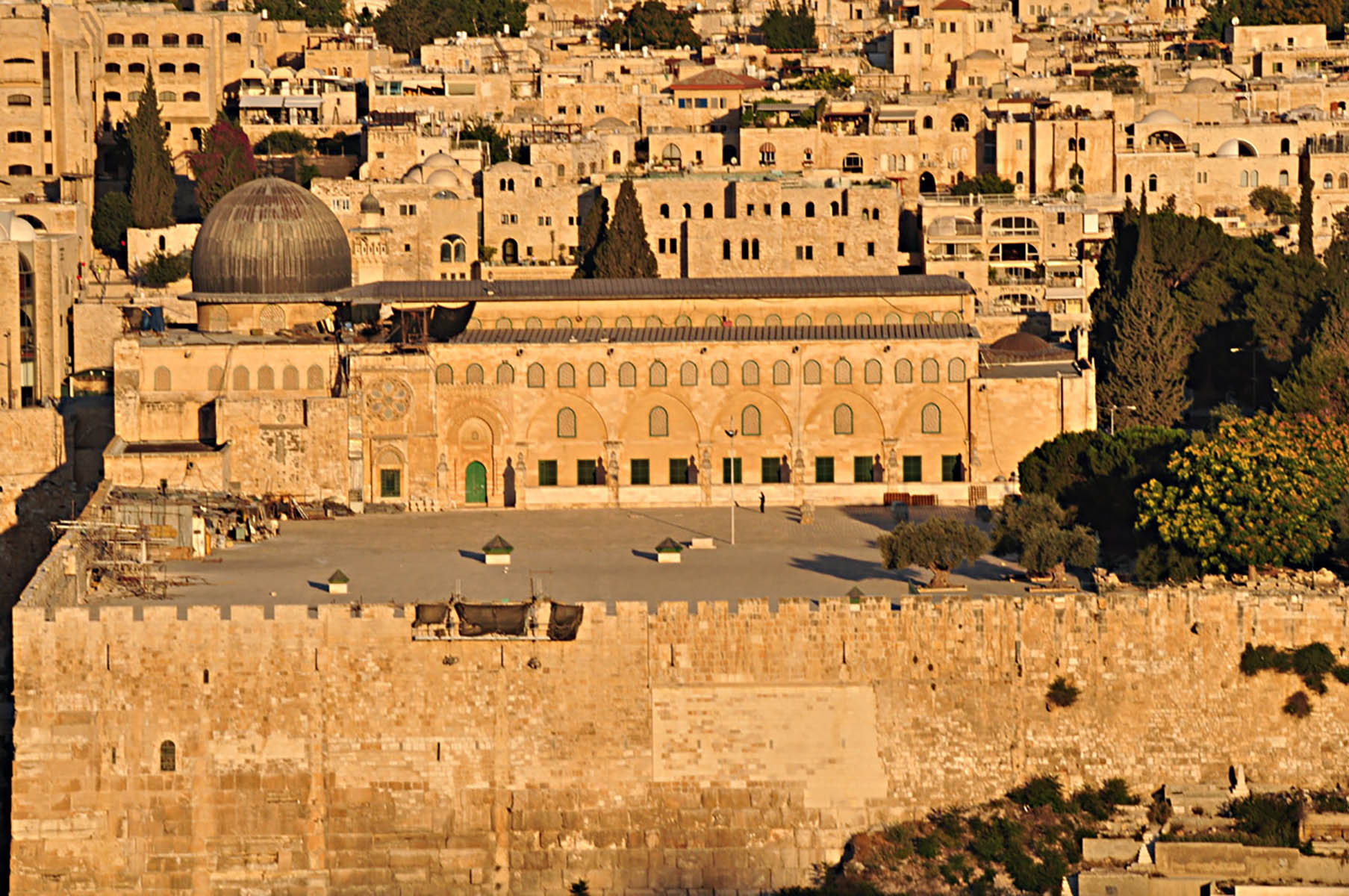
The importance of Palestine in the life of a Muslim
The excellence of the place where Jerusalem is sited has been proven not only historically but also in numerous texts of the Koran (or Qur’an) and the Sunna (Prophetic tradition). This excellence undoubtedly goes back to ancient times because it was where many prophets grew up and died. It was where they received inspiration and where many messages were revealed to them that would mark the course of most events inancient history.
The Koran (Textual Revelation)
1. The Koranic text emphasizes the sacred nature of this land and its great importance throughout the course of history. The blessing bestowed upon it extends not only to the Al-Aqsa Mosque but also to its surroundings. (Al-Isra’, 1)
2. The Holy Land referred to in the Koran covers the whole of Palestine, including Jerusalem, formerly known as “Ilia”, or the Land of God (Al- Ma’ida, 21). The Koran underlines the holy or sacred epithet understood not only as exaltation, blessing and great importance, but also as a place of spiritual purity.
3. There are many passages in the Koran that narrate Abraham›s emigration from the land of the Chaldeans in Iraq to as far as Syria.(See Al-Anbiya’, 71)
These passages tell how God saved Abraham from being burnt at the stake and ordered him to emigrate to the land of Syria where the Holy Land is located. According to Qataadah’s version, Abraham was in Iraq and God, who sent him to Syria, saved him. It was then said that it would be the land of the Congregation and Resurrection of men and where Jesus Christ would be resurrected and the Antichrist would die.
4. Many interpreters of the Koran understand that the blessed land is Syria. (Al-Anbiya’, 81)
Historians are also most concerned about understanding the borders of the former Syria. Some extended them from Turkey in the north as far as the Arabian Peninsula, including Iraq. Others narrowed them down to only Palestine and its surroundings. In any case, Jerusalem is located within the greater Syrian territory, according to all historians and scholars. This is the most common version in the majority of the texts and accounts.
5. The allusion of the Koran to the change in the qibla – the direction which Muslims face to say their prayers – from Jerusalem to Mecca (Al-Baqara, 144), or from Al-Masjidu-l-Aqsa (the Sacred Mosque of Jerusalem) to Al-Masjidu-l-Haram (the great Mosque of Mecca), has been ratified repeatedly by numerous hadiths, or sayings of the prophet Muhammad.
This means that the orientation towards Jerusalem lasted almost fourteen months. During this time, the Prophet multiplied his additional prayers and his pleas to God so that he could be directed towards the Kaaba, which is Abraham’s qibla. God attended his prayers and ordered him to go towards the old building. It is said that the first prayer he uttered facing the direction of the new qibla was Al-Asr (the afternoon prayer), as given in As-Sahihayn, two outstanding and reliable sources of prophetic traditions in Sunni Islam. More than one exegete confirmed that the reorientation of the qibla was revealed to the Prophet when he had just completed half of the midday prayer at the Bani Salmah mosque, later known as the Masjidu-l-Qiblatayn (the mosque of the two qiblas, which was built first in Medina). As for the people of Qobaa’, the news did not reach them until the dawn prayer the following day, as stated in As-Sahihayn.
6. We should remember that there are numerous verses in different chapters of the Koran that emphasize the excellence of the Holy Land and its surroundings. The fact of stressing the direction of prayer towards Jerusalem before this was changed highlights its great importance and its holiness.
The Sunna (Conceptual Revelation)
The Prophet himself often alluded to the excellence of the Holy Land. He said: “The places that are worthy of pilgrimage are: Al-Masjidu-l-Haram (the Great Mosque of Mecca), my mosque of Al-Medina and Al-Masjidul- Aqsa (the Mosque of Jerusalem)”.
1. Tradition holds that the reward for worshipping at the three mosques multiplies according to their rank. Praying at the Great Mosque of Mecca is equivalent to one hundred thousand prayers. At the Mosque of the Prophet in Medina it is equivalent to one thousand prayers and, at the Mosque of Jerusalem, five hundred. So God placed the latter in third position and multiplied the divine recompense.
2. The Mosque of Jerusalem is the second place of worship built on Earth after the Great Mosque of Mecca.
3. Zayd Ibn Thabit recounted that he heard the Prophet say: “Blessed be Syria … Blessed be Syria!” They asked him: “Why are you praising Syria?” He said: “Because the angels have spread their wings over Syria”.
4. Al-Bukhari and Muslim mention that it was Al-Baraa’ Ibn ‘Azib who said: “We prayed with the Prophet facing Jerusalem for sixteen or seventeen months, and then we changed towards Mecca”.
5. Jerusalem was the goal of the Prophet’s night-time trip and the starting point of his ascension to heaven.
6. In his invocation to God, Moses exalted Jerusalem and the Holy Land, and on his deathbed he asked God to bring him closer.
7. They are many quotations (hadiths) by the Prophet that beseech God’s blessing for Syria.
8. Ahmad and At-Tirmidhi quote Salim Ibn ‘Abdillah as saying he heard the Prophet state: “Fire will come from Hadramaut; that is to say, at the end of time, the doors of hell will open and the people will congregate”. We said: “God’s messenger—so, what are your orders?” He replied: “You must go to Syria”.
9. Numerous exegetes and scholars, including Al-Qurtubi and Ibn al- Juzi, agreed on the exegesis of the Koranic verse that reads: “Listen on the day the town crier calls from somewhere nearby” Qaf (41). It was Israfil, standing on the rock of Jerusalem, from where the Prophet’s Ascension began, calling the people to go to the final judgment. That is where all the dead would start to congregate and that is what Imam Ahmad says in his collection, when he quotes Maimunah Bintu Saad, the Prophet’s wife, who said: “Prophet of God! Is our end in Jerusalem?” The Prophet answered: “Land of the congregation of the dead, and of their Resurrection”.
Some Muslims exaggerate by venerating the Rock. Its exaltation, according to Ibn Taymiyyah, is considered to be a heretical invention, as there is no text that justifies its consecration. Even some people believe that it is suspended in air without any support and this is not the case.
In fact, there is a cave underneath it and whoever goes inside it gets the sensation that the rock is hanging.
10.Many of the Prophet’s companions, such as the scholars and the devout, visited Jerusalem. They prayed within its boundaries, thus heeding the call made by Muhammad in this respect. Among the companions who visited Jerusalem were: ‘Umar Ibn al-Khattab, Abu Ubaydah, Amir Ibn al-Jarrah, the mother of the believers and wife of the Prophet Safya bint Hayi, Mu‘adh Ibn Jabal, Abdullah Ibn ‘Umar, Khalid Ibn al-Walid, Abu Dharr al-Ghafari, Abu Ad-Dardaa’, Salman al-Farisi, Amr Ibn al-‘As and Said Ibn Zayd of the ten foretold to be going to Paradise besides Abu Hurayra, together with Abdullah Ibn Amr Ibn al- As, among others.


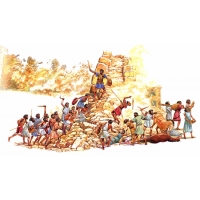
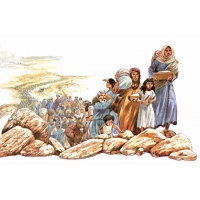
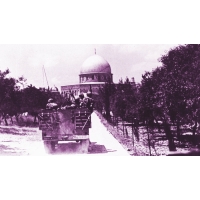
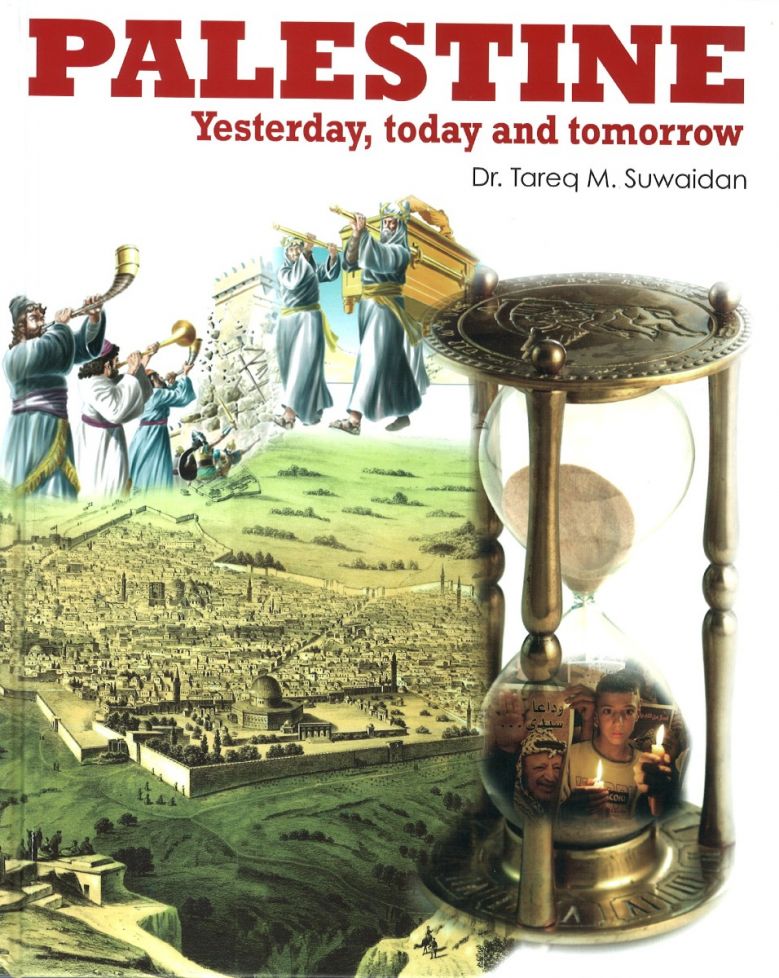
تسجيل الدخول
انشاء حساب جديد